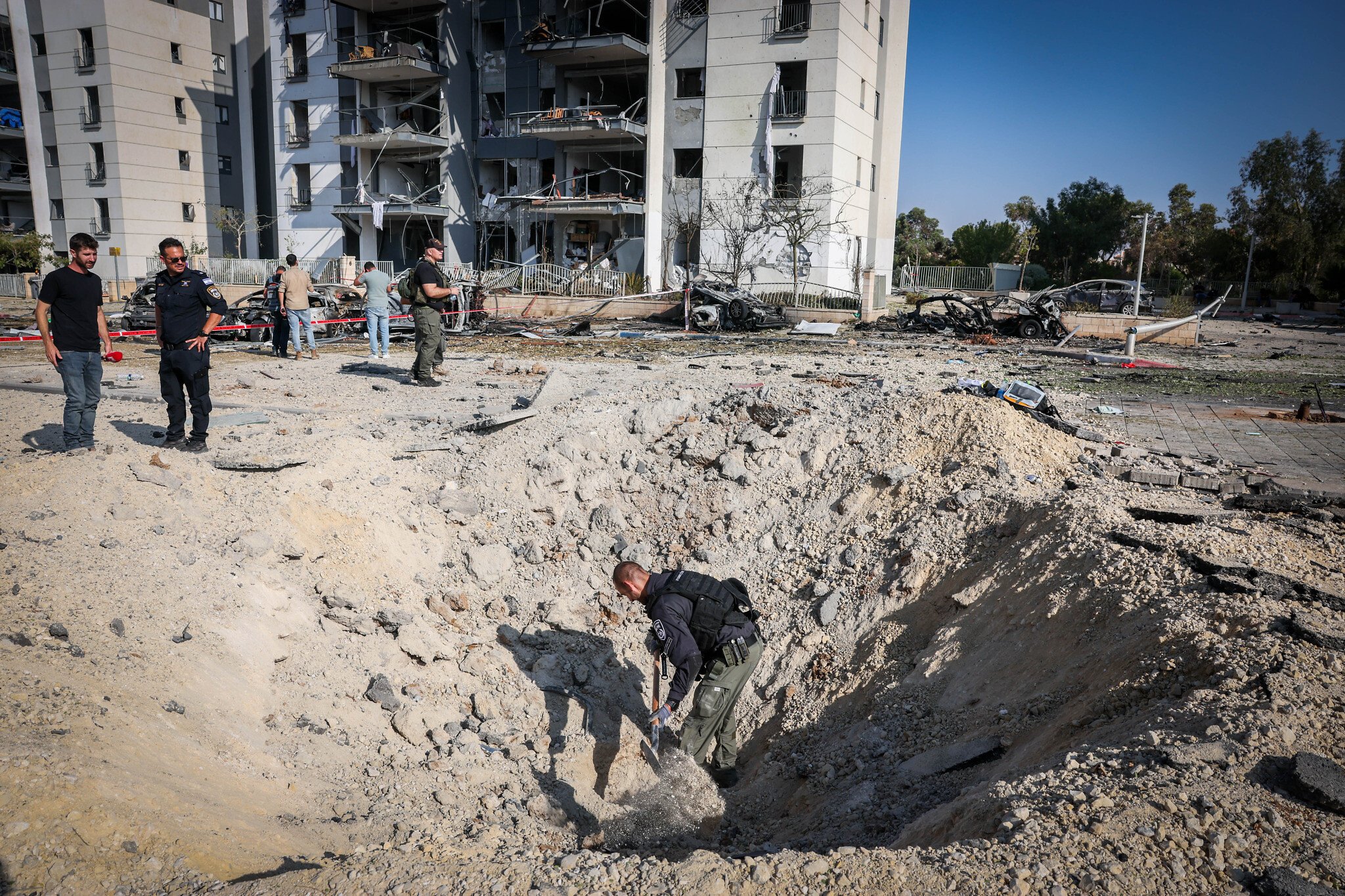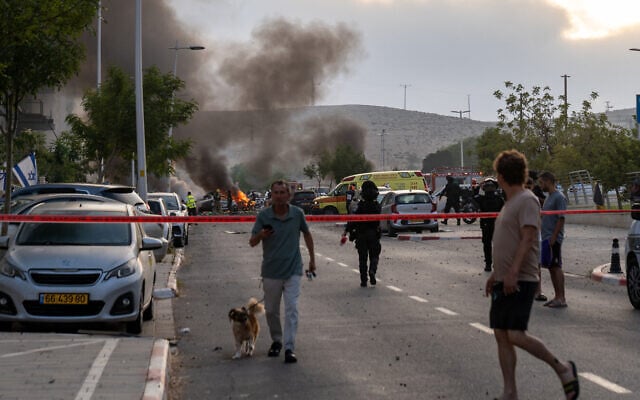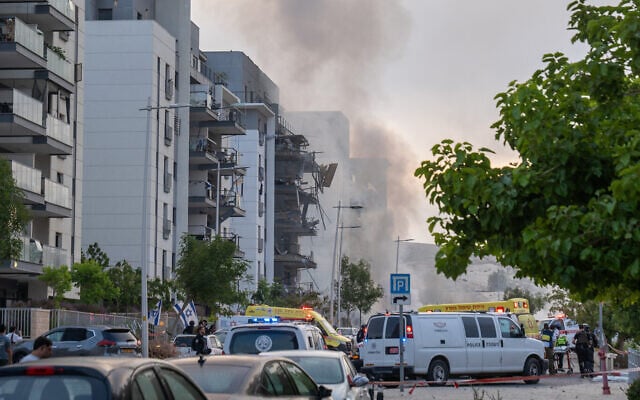



An Iranian ballistic missile struck Beersheba in southern Israel on Friday morning, lightly wounding seven people and causing substantial damage to homes, as Israel and Iran continued their exchange of fire.
The southern city’s Soroka Hospital, which was hit by an Iranian strike a day earlier, said it had received seven casualties, all lightly injured.
The missile struck a road near several apartment blocks, creating a large crater and setting several cars on fire. Firefighters rushed to the scene to extinguish the blaze.
The shockwave from the impact ripped apart the adjacent apartment building’s balconies and blew out the windows in other surrounding structures, sending glass shards and chunks of debris flying.
Residents of the damaged buildings, the vast majority of whom were sheltering in their bomb safe rooms, were evacuated by police, Magen David Adom medics, and Home Front Command search and rescue soldiers.
MDA said it treated five people who were slightly hurt by the shockwave, blunt trauma, smoke inhalation, as well as acute anxiety. They were taken to Soroka hospital, along with others in the city who were hurt after falling while running to shelters.
Speaking to reporters at the scene, Beersheba Mayor Ruvik Danilovich said, “The self-discipline of the residents who immediately entered safe spaces saved lives.”
“There’s major damage, but people acted according to Home Front Command guidelines and saved themselves. Our challenge is to gather the residents and find a solution for them. We’ve prepared for this,” he said.
One missile was fired from Iran in the attack, which was not intercepted by air defenses, an Israel Defense Forces official told The Times of Israel.
The IDF reported striking other primed ballistic missile launchers in Iran, foiling a larger attack.
Earlier in the night, around 3 a.m., the Israel Air Force said it intercepted three Iranian drones that had triggered sirens in the Dead Sea.
Another drone was intercepted over Haifa shortly after midnight, the military said.
The IDF released footage showing some of the interceptions.
Iran has fired over 450 ballistic missiles and around 1,000 drones at Israel in the past week.
Most have been shot down by Israel’s air defenses, which detect incoming fire and shoot down missiles heading toward population centers and critical infrastructure.
The military has routinely emphasized that, as good as Israel’s multilayered air defenses are, the coverage they provide is not hermetic. It has urged Israelis to heed Home Front Command instructions to take shelter in safe rooms and bomb shelters when incoming missile warnings are received.
The military said on Friday that the IAF had carried out a wave of strikes overnight, targeting dozens of Iranian military facilities and a nuclear research site.
More than 60 fighter jets were involved in the strikes, dropping 120 munitions, according to a statement by the military, which added that the targets included “several industrial missile production sites” in Tehran, which had served as “the industrial core of Iran’s Defense Ministry.”
“Among the targets were military industrial sites producing missile components and facilities for manufacturing raw materials used in casting missile engines,” the IDF said.
The strikes also hit the “headquarters of the SPND nuclear project,” the statement added, referring to a site that had already been targeted since the current conflict with Iran began.
“SPND serves as a hub for research and development of advanced technologies and weaponry for the Iranian regime’s military capabilities. It was established in 2011 by Mohsen Fakhrizadeh, the founder of Iran’s nuclear weapons program,” the statement said.
Another site that was struck had been used to manufacture a “component essential to the regime’s nuclear weapons program.”
The military said that on Friday morning, the IAF struck three ballistic missile launchers primed for an attack on Israel, along with an Iranian military commander who was operating at the launch site in Iran, and issued footage of the strikes.
The strikes, according to a military official, took place shortly before the missile attack on Beersheba, and had foiled a larger attack on Israel.
Earlier in the night, the IDF issued an evacuation warning for Iranian civilians in the Sefidrood Industrial Park and the village of Kalash Taleshan in the country’s northwest.
The warning was issued ahead of what the IDF said is a continuation of its strikes on Iranian military infrastructure across the country, but no strikes in the area have so far been reported.
With Iran’s internet being shut off to the outside world, it is unclear just how many people in Iran would be able to see the message.
Additionally, on Friday, the military said IAF fighter jets in recent days struck several Iranian air defense batteries in Isfahan and Tehran, as part of efforts to expand its air supremacy in Iran.
The military said the strikes hit the surface-to-air missile launchers and radars, “that were intended to target IDF aircraft and prevent their operations.”
IAF fighter jets and drones “continue to operate freely over Iran, striking military targets of the Iranian regime in western and central Iran,” the IDF said, adding that it will “continue working to expand aerial freedom of action in Iranian skies and to achieve air superiority.”
On June 13, Israel launched a campaign of airstrikes in Iran to decimate the Islamic Republic’s nuclear and ballistic missile programs, which Jerusalem characterized as an imminent, existential threat. Iran has responded with deadly barrages of ballistic missiles at civilian population centers and military targets in Israel.
Iran, which vows to destroy Israel, has always denied any ambition to develop nuclear weapons, but its enrichment levels reach far beyond any civilian purpose, and the IAEA says it has obstructed inspectors from visiting its nuclear sites.
A Washington-based Iranian human rights group said at least 639 people, including 263 civilians, have been killed in Iran and more than 1,300 wounded.
In Israel, 24 people have been killed and thousands have been wounded by Iran’s ballistic missile attacks. Massive damage has been caused to residential areas in several of the strikes.
Times of Israel staff contributed to this report.



